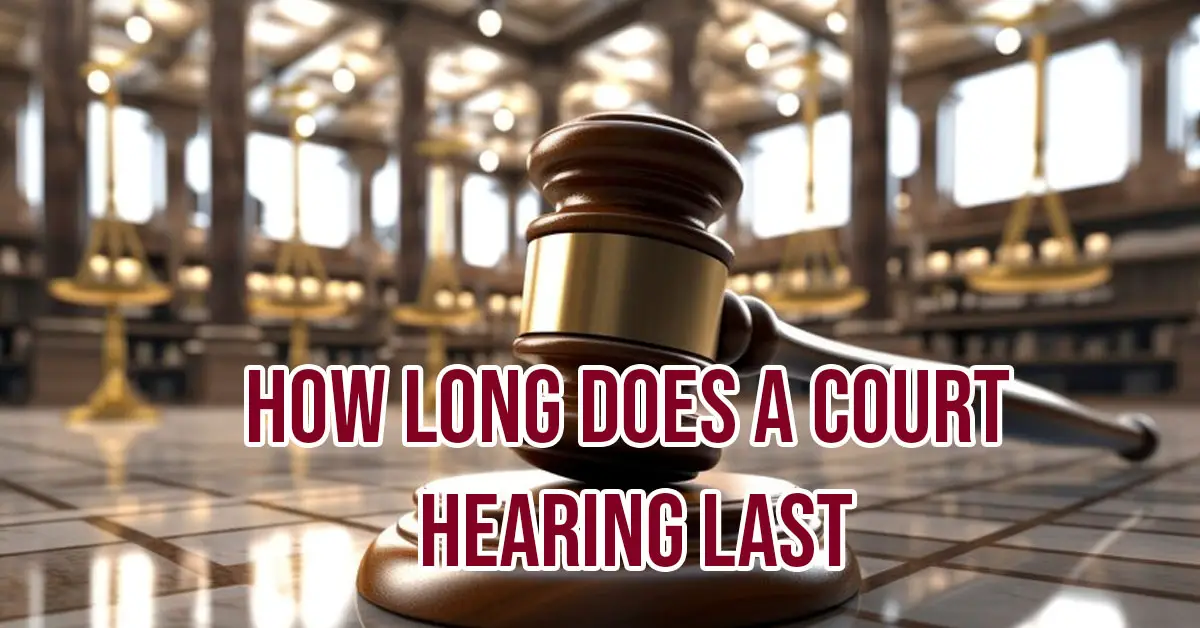Unveiling the Duration of Court Hearings: A Deep Dive into the Judicial Process
Exploring the Timeframe of Court Hearings
Court hearings, distinct from trials, are often less formal and shorter, primarily involving oral arguments in the litigation process. The primary objective of these hearings is to explore the potential resolution of issues without resorting to full-fledged trials.
Duration of Court Hearings
Typically, court hearings have a shorter duration compared to trials. A standard hearing can span from one to two hours, although some may conclude within minutes, while others extend over multiple days. The duration hinges on the volume and complexity of the presented evidence. In contrast, trials can persist for weeks, days, or even hours.
Diverse Types of Court Hearings
Court hearings come in various types, each serving a distinct purpose at different stages of legal proceedings. The nomenclature of a court hearing signifies its specific stage and objective. Here’s an overview of some common types:
1. First Appointment Hearing
In this initial hearing, the court reviews the parties’ applications for the first time, delving into each party’s position. The court encourages mutual agreement, and if unresolved, requests additional evidence and schedules another hearing.
2. Fact-Finding Hearing
Common in cases of child abuse or domestic violence allegations, a fact-finding hearing seeks clarity in situations where facts are unclear. Courts arrange such hearings when essential for a fair case ruling.
3. Financial Dispute Resolution
Focused on financial agreements between parties, this hearing involves a judge scrutinizing documents and positions. While not the final hearing, it informs parties of potential outcomes if a final hearing occurs, and an agreement is reached.
Courtroom Settings
Court hearings primarily transpire in courtrooms equipped with recording facilities. The judge decides whether the hearing is public or private. A public hearing allows the presence of public members, whereas a private hearing limits attendance to the involved parties, witnesses, and advocates.
Key Proceedings in Hearings
In a typical hearing, the judge listens to the claimant, who initiated the case, followed by the defendant, presenting evidence to support their stance. Claimants and witnesses swear an oath, making a legally binding commitment to the court.
Judicial Decisions and Post-Hearing Instructions
The judge renders a final decision after evaluating all evidence. A ruling letter follows the hearing, not detailing the reasons behind the decision. The judge may instruct immediate actions, such as evidence preparation for the next hearing or financial settlements.
Expert Tips for Navigating First Court Hearings
1. Mastering the Basics
Prepare thoroughly for court hearings, ensuring adequate rest, a healthy breakfast, and effective communication with your attorney. Organize documents meticulously, especially if representing yourself. Dress professionally, reflecting respect for the court.
2. Understanding the Judge’s Perspective
Recognize the constraints judges face due to limited resources. Conduct extensive research on the judge’s background and previous rulings to comprehend their experiences and potential biases.
3. Courtroom Conduct
Arrive early to address any missing documents. Avoid metallic objects and turn off mobile phones. Address the court respectfully, adhere to turn-taking, and refrain from interrupting. Maintain composure, providing short and precise answers without displaying emotional reactions.
4. Post-Hearing Etiquette
Remain composed regardless of the outcome, express gratitude to the judge and court staff, and inquire about any required post-hearing procedures. Consult with your attorney for a debrief before leaving.
In Conclusion
Understanding the duration of court hearings is crucial for anyone navigating the legal process. Unlike trials, these hearings are briefer and less formal, with various types serving distinct purposes at different stages. Armed with knowledge and proper preparation, individuals can navigate court hearings with confidence and respect for the judicial process.
FAQs:
- How long do typical court hearings last?
- Court hearings usually range from one to two hours, depending on the evidence presented.
- What are the different types of court hearings?
- Common types include First Appointment, Fact-Finding, and Financial Dispute Resolution hearings.
- Where do court hearings take place?
- Court hearings primarily happen in courtrooms, either in public or private settings.
- How does a judge make a decision after a hearing?
- The judge evaluates all evidence and sends a ruling letter with the decision, often without detailing the reasons.
- What are the best tips for a first court hearing?
- Prepare thoroughly, understand the judge’s perspective, exhibit proper courtroom conduct, and remain composed post-hearing.

